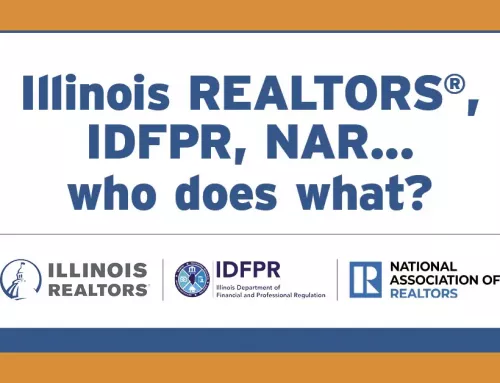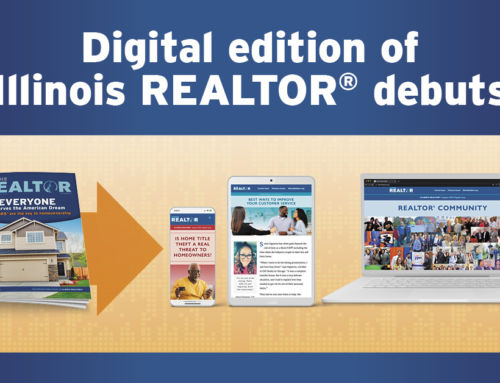Clients ask REALTORS® a variety of questions when they are buying or selling a home. But some questions, whether the client intends it or not, can veer into perilous territory and raise red flags when it comes to fair housing rules.
“I’m not from the area. What are some good, safe neighborhoods to live in?”
“Can I ask that some potential buyers get pre-approved for financing before we get too far in the offer process? I don’t want to waste my time if some people aren’t qualified.”
If those questions don’t raise concerns, they should. The Fair Housing Act prohibits housing discrimination and aims to provide equal housing opportunities for everyone. For REALTORS®, inclusivity isn’t just the law, it’s the right thing to do.
Earlier this year, the National Association of REALTORS® reaffirmed an ongoing commitment to the issue by announcing a new Fair Housing Action Plan aimed at enhancing REALTOR® accountability and training.
So how do you uphold fair housing standards and answer some of the tough questions that can come your way? Here are a few of the key areas to be aware of and how you should handle them.
Fair Housing at a glance
What is the difference between the classes protected by fair housing law in Illinois, and those protected by federal law?
- Federal law includes the following protected classes: color, disability, familial status, national origin, race, religion and sex.
- Illinois law is more expansive than federal law and includes the following classes: race, color, religion, sex, national origin, ancestry, age (40 and above for employment matters), order of protection status, marital status, disability, military status, sexual orientation, pregnancy, unfavorable discharge from military service in connection with employment and familial status.
- Check local human rights ordinances prohibiting discrimination against additional protected classes not covered by state and federal law.
- It should be noted that Article 10 of the NAR Code of Ethics and Standards of Practice includes sexual orientation and gender identity as protected classes.

Discriminatory advertising
What guidelines can my brokerage implement and share with our licensees to make certain our advertisements do not violate fair housing laws?
Be aware that fair housing laws do not only apply to the very visible advertising such as billboards or newspaper ads. The laws apply to any type of advertising including applications, flyers, brochures, signs, banners and even posters or pictures in a real estate office. They also apply to personal communications such as texts or conversations.
REALTORS® should avoid using language in advertising or other communication channels that can be construed as limiting access to the property to any particular group of people. Be aware that even a poster or picture in a real estate office or in front of a condominium association representing one type of person could be a violation.
For example, if all of the photographs in a poster are of young, white, professional looking people and there is a distinct absence of children, or persons of differing races or nationalities, this could be construed as an attempt to convey a limitation of access to the property.
Avoid using phrases that have been associated with discriminatory practices in the past. Good examples of language to avoid include, “exclusive” or “restricted.” Keep in mind that sometimes discriminatory objectives can be veiled in seemingly neutral language, so choose words carefully. Focus on objective information like property details and avoid using language that indicates what “type” of person you think would be a “fit” for the property.
Consider using U.S. Department of Housing and Urban Development’s (HUD) equal housing opportunity or fair housing logo in advertisements. Although not required, it is highly recommended and a good way to convey the message that you support and uphold fair housing requirements.
New trend to watch: criminal history and housing accessibility
The new Just Housing Amendment to the Cook County Human Rights Ordinance aims to reduce housing discrimination by limiting how much of an applicant’s previous criminal history can be considered when evaluating rental applications.
The ordinance, which only applies to Cook County, requires a two-step screening process, with ability to pay considered first.
Find an FAQ, podcast and more at: www.IllinoisRealtors.org/JustHousing

Steering
May a REALTOR® recommend a client look at housing in a particular neighborhood because they feel the client might be more comfortable in an area based on their nationality or race?
No. That would be “steering” which is a form of discrimination prohibited by fair housing laws. Steering is the practice of directing potential buyers or tenants either toward or away from a particular neighborhood or community based upon a particular characteristic and it applies not only to race, but also sexual orientation, religion, age and all protected classes.
Even if there is no intent to discriminate, and you believe you are providing your buyer clients with what you feel is a better fit, that is not your role. You need to be mindful that intent does not matter in the world of discrimination, and it is not an element to prove that discrimination took place.
REALTORS® need to be conscious of the potential discriminatory impact of their words and actions. Provide clients with listings based upon the objective criteria they have provided for their future home. That may include special features, price point, desired commute time or distance to a grocery store.
How can a REALTOR® respond if a buyer client asks about the quality of schools in the area?
REALTORS® should refrain from offering personal opinions about a community or an area because an opinion could be misconstrued to be based upon prohibited criteria.
Instead, you can guide buyers to third party resources that will provide answers to questions about neighborhood-specific information. For example, school ratings and crime statistics are all public information. A client can access these public records and review them, thereby allowing them to make their own conclusions about a neighborhood or geographical area.
A REALTOR® should not create a handout or pamphlet containing this information, even if it is simply duplicating information from public records. Links to objective information can be provided upon request.
How can a REALTOR® screen applicants or potential buyer clients so they are not “wasting time” showing property?
Avoid any inconsistency in the prerequisites required to provide services. For example, if office policy or the seller requires a prequalification letter from a lender, that must be applied to every client across the board and records should be retained to support that the practice is applied consistently. Any time requirements are inconsistently applied, there is the risk of actions being perceived as discriminating on a prohibited basis.
If a prospective resident or client makes any accusation of discrimination, HUD or another human rights agency may ask for all documentation related to all contacts with the party, starting with the first one. That information may include any application forms, rent offered, properties shown, deposits and fees.
It is important to keep careful records showing that all prerequisites were applied uniformly for all properties and prospective clients. Consider reviewing office policies and procedures and making sure the need for consistency is addressed and made clear to all personnel/licensees.
Fair Housing resources
Illinois REALTORS® can access fair housing videos, brochures, CE courses and more at www.IllinoisRealtors.org/FairHousing. This is a members-only page, so you will need to log in.
The National Association of REALTORS® also offers a variety of REALTOR® resources at www.NAR.Realtor/Fair-Housing

Disability issues
When it comes to equal access to housing, reasonable accommodations and modifications must be made for people with disabilities. This could include installing ramps outside a building entrance, widening doorways or providing reserved accessible parking spaces.
Be aware of some conditions that do not appear to be disabilities. One example of this is hoarding, which might reveal an obsessive/compulsive disorder.
When it comes to hoarding, can a property manager evict a tenant who, after repeated notifications that they are violating the terms of their lease, has failed to remove excess belongings that are interfering with required maintenance or inspections?
Although tenants do typically have a duty to comply with the terms of their lease, including terms addressing cleanliness and upkeep, fair housing laws may give tenants who are “hoarders” certain rights in some instances.
Hoarding is recognized as a mental disability and may also be related to other disabilities like obsessive compulsive disorder, dementia, psychosis and/or depression. If a person suffers from hoarding and they have been threatened with eviction proceedings, they may be able to request a reasonable accommodation of the lease provision prohibiting the behavior.
The reasonable accommodation may be allowing the tenant more time to address the underlying issues leading to the hoarding behavior and to seek mental health services. A reasonable accommodation request could possibly be denied if the behavior poses a direct threat to the safety of the property owner or other tenants.
In cases of hoarding or other behaviors that could be related to an underlying mental health issue, which could be recognized as a disability, it is a good idea to establish a practice of consulting with an attorney about how to handle the situation.
On the topic of reasonable accommodations, what is the latest guidance regarding assistance animals?
A new Illinois law, the Assistance Animal Integrity Act, went into effect on Jan. 1, 2020, and clarifies the requirements for someone to establish a disability and a disability-related need for an assistance animal.
Under the new law, anyone requesting accommodation for an assistance animal may be asked to provide supporting documentation from someone in a “therapeutic relationship” with the person, e.g., a physician or other medical professional, a mental health service provider, non-medical service agency or reliable third party who is in a position to know about the individual’s disability.
“Therapeutic relationship” does not include an entity that issues a certificate, license or similar document without conducting a meaningful assessment of a person’s disability or a person’s disability-related need. This might stem the practice of “buying” a certificate from online. Even a single visit to a provider may not suffice to support certification under the new law.
If the applicant asks for accommodation for more than one animal, the housing provider may ask for supporting documentation as to the need for each of the animals, if the disability or need is not obvious.
The new law further protects housing providers from liability because, under Section 15 of the law, the housing provider will not be held liable for injuries caused by an assistance animal allowed on the property as a disability-based accommodation.
Finally, the law does contemplate circumstances when a housing provider may be able to deny a request for accommodation (or rescind an accommodation). Some examples might include when the accommodation threatens the health of another resident who had severe allergies, or accommodation requires the property owner to make unduly burdensome and expensive alterations to the property to accommodate the animal.
The occasions in which a refusal would be appropriate under the new law will become clear over time as the new law is applied. In the meantime, property owners, property managers and other housing providers should consult with their attorneys to make certain they are applying the new law appropriately.
HUD has prepared a notice outlining more specific guidelines for assessing a person’s request to have an animal as a reasonable accommodation under the Fair Housing Act. (Note this replaces HUD guidance that has been used since 2013).
Housing guide
The Illinois Department of Human Rights offers a helpful guidebook on the topic, “Reasonable Accommodations and Modifications: A Guide for Housing Professionals.”





















